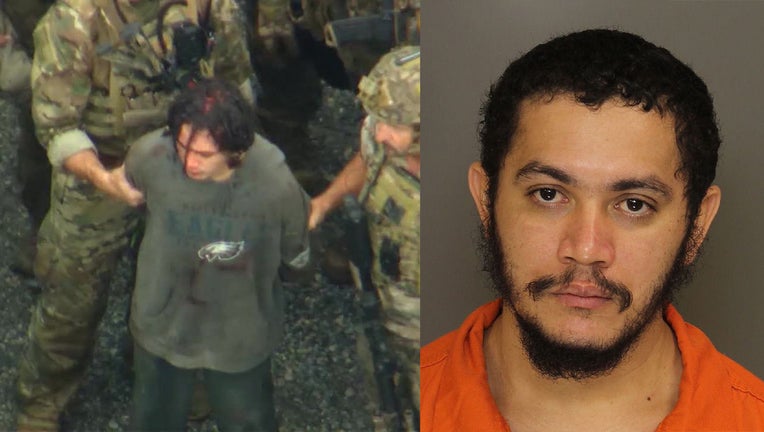As captured Danelo Cavalcante resumes sentence in US, homicide in native Brazil remains unsolved

RIO DE JANEIRO - When the Brazilian prosecutor in charge of a homicide case targeting Danelo Cavalcante saw footage of the 34 year-old crab-walk out of a U.S. prison last month, he thought the fugitive might try to head home, where he stood to receive a considerably lighter sentence.
Cavalcante fled Brazil in 2018, several months after allegedly shooting a man whose family members said owed him money. Today, Cavalcante faces life in a U.S. cell for the brutal killing of his girlfriend.
"I thought he wanted to escape to Brazil," Tocantins state prosecutor Rafael Pinto Alamy told The Associated Press on Thursday. "He would have to comply with the prison rules here, which are much more lenient."
A court hearing in Cavalcante’s Brazilian homicide case has been set for Oct. 11. The case is expected to go to a jury, probably next year, Alamy and Cavalcante's lawyer told the AP.
Brazil does not deliver life sentences. Even had Cavalcante been sentenced to the maximum 30 years, Alamy said, he might have been able to walk free after some 12 years with reductions for good behavior.
Just after midnight on Nov. 5, 2017, Cavalcante allegedly killed a man outside a restaurant in Figueiropolis, a small rural town of about 5,200 inhabitants in Tocantins, a state in Brazil's hinterland.
The 20-year-old victim, Valter Júnior Moreira dos Reis, was shot five times, according to a police report seen by the AP. His sister later told officers she thought Cavalcante had attacked him because of a debt her brother owed him related to damage done to a car, the report read.
Cavalcante then ran to his car and fled the scene, a direct witness told officers.
Authorities in Brazil opened an investigation and, within a week, a judge had ordered his preventive arrest, documents show. Law enforcement was not able to find Cavalcante, who was not from the area.
According to the Brazilian investigative television show Fantastico, Cavalcante was able to travel to capital Brasilia in January 2018. It is unclear whether he used fake documents to travel, but he was only included in a national warrant information system in June of that year, the prosecutor working on the case told the AP.
Even if he had traveled with his own identification, he was only a fugitive in the state of Tocantins, Alamy said.
Cavalcante’s arrest in the U.S. on Wednesday made the front page of many Brazilian newspapers. Coverage of the manhunt has likewise been splashed across papers and television programs throughout his 14 days on the run, despite the fact that the country is relatively more accustomed to jailbreaks and fugitives who, sometimes released from jail temporarily, decline to return.
Cavalcante's lawyer, Magnus Lourenço, said he was unsure his client would be notified of the October court hearing in time, and that it might be delayed.
Meantime, loved ones of the victim in Brazil have expressed relief that Cavalcante will resume paying for his crimes, even if in another country.
"We’re pleased (with his capture), but there was no justice for my brother in Brazil. Justice is very slow," Dayane Moreira dos Reis, the victim's sister, told newspaper Folha de S. Paulo. "We spent seven years without any answers. We (now) hope he’ll stay in prison for his whole sentence."

